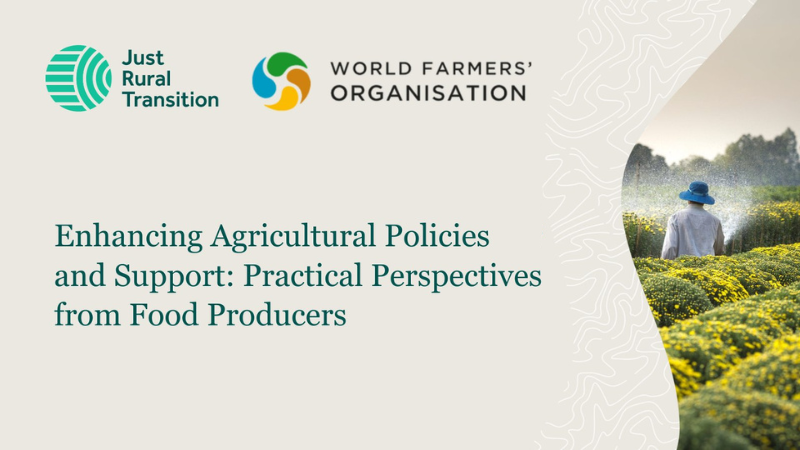WFO – JRT Virtual Dialogue on how policies and public support for agriculture can be enhanced to benefit food producers worldwide.
On Wednesday, 26 October, the World Farmers’ Organisation (WFO) and the Just Rural Transition Initiative (JRT) organised a virtual dialogue with world farmer organisations’ representatives to discuss what is working with policies and public support for agriculture, what needs to change, and how farmers can be at the centre of the process.
Throughout 2022, the JRT has held a series of global and regional consultations with farmer organisations, businesses, civil society, and policymakers to collect participant perspectives on how agricultural policies and public support can be enhanced to deliver better outcomes for people, nature, and climate.
The 2-hour virtual event aimed to reflect on conversations held throughout the year, gather feedback from initial participants, create a set of key messages on behalf of farmers, and bring these outputs at the high-level ministerial event organised by the Egyptian COP27 Presidency, FAO, and FCDO while ensuring farmers’ key messages are included in Practical Perspective’s resulting brief.
This brief aims to capture for policymakers and the broader ‘repurposing’ community of practice the key challenges, achievements, and lessons learned about repurposing from a wide range of farmers’ organisations, technical officials, and other stakeholders.
Speaking to the importance of including farmer voices in policy processes, Dr Ishmael Sunga, CEO of the Southern African Confederation of Agricultural Unions (SACAU), a WFO partner, remarked that in the past, he has found himself a lone voice representing farmers’ views. He was heartened to see more involvement in dialogues like these. He urged policymakers to listen to farmers and involve them in every decision-making process concerning the agricultural sector.
In summing up the dialogue, Ann Tutwiler, JRT Senior Advisor, said: “short-sighted, single-focus subsidies mean that we are renting productivity for one season, and we are not investing in long-term productivity, food security or sustainability of our Food Systems”.
“What agenda are the governments implementing?”, asked Ms Luisa Volpe, Head of Advocacy, Policy and Partnerships of the World Farmers’ Organisation, delivering the closing remarks, “If they are aiming at having an efficient and effective rural sector, they should partner with farmers through their national organizations, from the designing of policies to take into active consideration what the farmers and rural sectors really need”.
In conclusion, what emerged from this fruitful exchange is clear: involving farmers and their organisations from the beginning is key for Governments to succeed in repurposing agriculture policies for people, nature, and climate!
